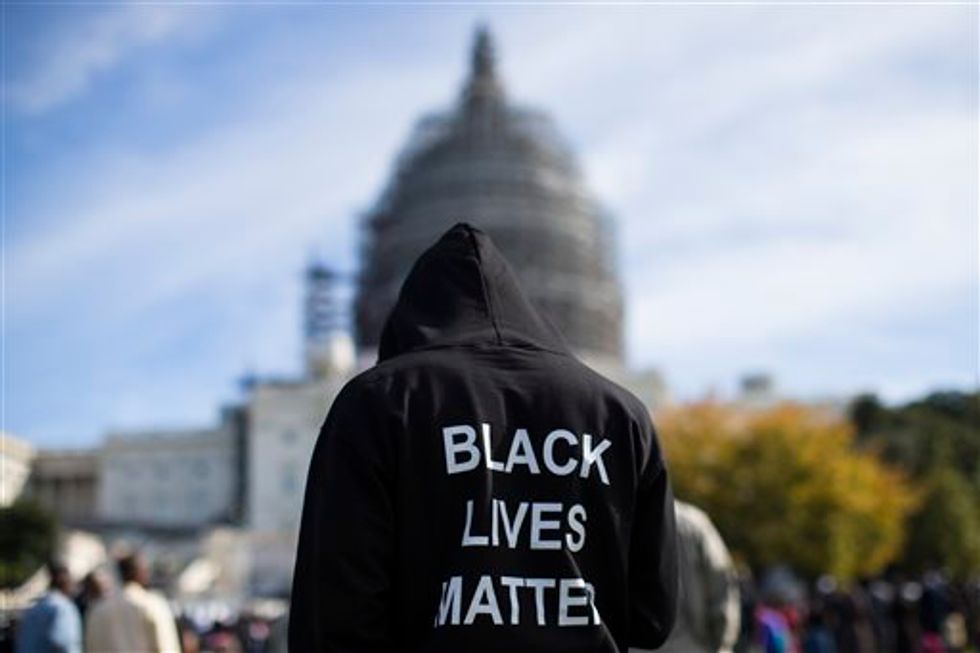
Supporters of the Islamic State carry the terror group's flag. (AP Photo)

In the wake of the Paris attacks, the debate about terrorism has taken its usual turn into overblown rhetoric. And there are two instances of it in particular that need to be challenged.
Before we get to the first one, think about the “Black Lives Matter” slogan. Many people have taken offense at the expression: why should the focus be on black lives? Don’t all lives matter?
The rejoinder has been that, of course, all lives matter, but African Americans are facing problems that other people in the country aren’t facing. They get unequal treatment at the hands of law enforcement, and so “Black Lives Matter” is supposed to remind everyone that African Americans ought to be treated equally.

Leave aside whether the Black Lives Matter movement is accurately describing the situation, that’s what the phrase conveys. As President Barack Obama explained, the expression is meant to highlight that, “there is a specific problem that is happening in the African American community that’s not happening in other communities. And that is a legitimate issue that we’ve got to address.”
Which brings us to the phrase, “radical Islam.” Some of the same people who support the Black Lives Matter movement (for example, Hillary Clinton) refuse to say we’re at war with “radical Islam” on the grounds that it declares war with Islam in general. But of course it doesn’t mean anything like that, it simply means being at war with people who – like Al Qaeda or the Islamic State – will use violence to force Islam on others.
And, let’s face it, just like the phrase “Black Lives Matter” highlights, there is currently a specific problem that is happening in the Muslim community that’s not happening in other communities – say, among Christians or Buddhists – when it comes to people resorting to horrific terrorism in order to impose their religion on others.
As President Obama would say, that is a legitimate issue that we’ve got to address.
“Radical Islam” isn’t tarring all Muslims as terrorists (or vice versa) any more than “Black Lives Matter” is espousing black supremacy, just like opposing “white supremacy” or “bad cops” doesn’t mean being opposed to all white people or all police officers. Wouldn’t it be nice if Clinton and her compatriots could keep consistent on this?

The other rhetorical straw man that needs to be dealt with is the idea that explaining evil means justifying it. Rush Limbaugh went on a long tirade this week denouncing people who point to American foreign policy in order to explain terrorism, as if those people are therefore arguing that terrorism against America and the West is justified.
But that’s nonsense. Explaining why people behave a certain way isn’t the same as justifying their behavior. You can explain much of what Germans did in World War II based on their humiliation at the loss in World War I, and their suspicion that they had been sabotaged from within, without arguing that they were right to do it.
There’s no doubt that the U.S. does things overseas that make others angry. If we station soldiers in Muslim countries, people get angry that our “infidel” troops are somehow defiling the holy land. If we eliminate a terrorist with a drone strike that also kills a child, somebody’s going to be angry at us for killing innocents. If we bomb a mosque that’s being used to store militants’ weapons, we’ll get excoriated for “bombing sacred sites.”
Being justifiably angry doesn’t mean being justified in resorting to terrorism.
It’s almost guaranteed that, on any given day, U.S. foreign policy is going to make someone angry. But that doesn’t mean their anger is justified. And, even if it is, being justifiably angry doesn’t mean being justified in resorting to terrorism.
Understanding why people are angry at us gives us valuable information when it comes to predicting their violence, and even undermining it. Violent groups like Islamic State draw in all sorts of people. Some are psychopaths who are drawn to bloodshed; some are in it for greed or thrills; some are out to avenge an injustice against their loved ones. Understanding their motives and explaining why they join tells you whether you have to beat them with force, or whether you can undermine them in other ways. (One of the triumphs of the Iraq Surge and the Anbar Awakening was when the U.S. paid Sunni tribes – essentially operating a jobs program – to fight against Al Qaeda in Iraq.)
That’s what’s going on when we point out that terrorism today has an Islamic component to it; that is, that terrorism today is more likely to be committed in the name of Islam than any other religion or ideology. We’re explaining (though not justifying) the behavior by noting its connection to a certain belief system.
Yes, it’s OK to say “radical Islam” and to explain why people resort to terrorism. In fact, it would be foolish not to do both at the same time.
–
TheBlaze contributor channel supports an open discourse on a range of views. The opinions expressed in this channel are solely those of each individual author.